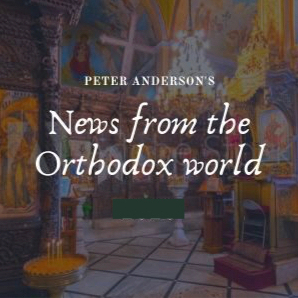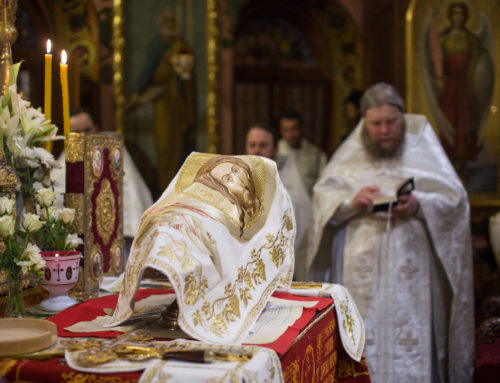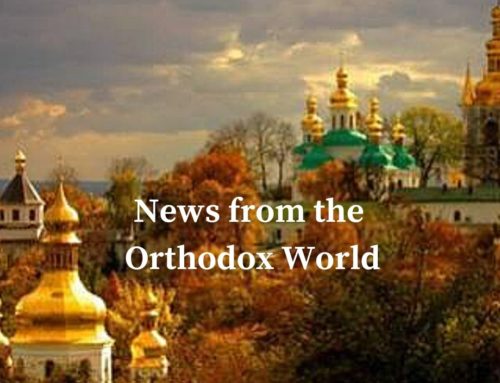Peter Anderson reports from the Orthodox world.
Longstanding reporter of the news from the Eastern Church, Peter Anderson shares our dream of a unified Christianity. His love for Orthodoxy has driven him to this personal mission to share the news of East with the world through his email list. The Urbi et Orbi Foundation is proud to share his efforts and his insights with you.

Metropolitan Filaret (Vakhromeev), Honorary Patriarchal Exarch of Belarus, died from the coronavirus on January 12 at the age of 85. https://eng.belta.by/society/view/metropolitan-filaret-honorary-patriarchal-exarch-of-all-belarus-passes-away-136486-2021/ He headed the Orthodox Church in what is now Belarus from 1978 to 2013. Since his retirement, he has not been in good health and has not appeared in public in recent years. During his active years as bishop and metropolitan, he was an extremely important hierarch in the Moscow Patriarchate. The Divine Liturgy and funeral for the Metropolitan will be held at 7:15 a.m. and 10 a.m. in the Holy Spirit Cathedral in Minsk on Thursday, January 14 and can be viewed live on the BOC YouTube channel. https://church.by/news/prjamuju-transljaciju-china-otpevanija-pochetnogo-patriarshego-ekzarha-vseja-belarusi-budet-vesti-telekanal-belarus-3
A very detailed English-language chronology of his life is found at https://orthodoxcanada.ca/Metropolitan_Philaret_(Vakhromeyev). See also https://mospat.ru/ru/2021/01/12/news190064/ (Russian). Filaret was well-known in the West and was very well-liked. His mentor was Metropolitan Nikodim (Rotov) of Leningrad, who was very open to ecumenical relations and who ordained Filaret as a bishop in 1965. After the death of Metropolitan Nikodim in 1978 and until the appointment of Metropolitan (now Patriarch) Kirill as head of the Department of External Relations in 1989, Metropolitan Filaret was the representative of the Moscow Patriarchate who travelled the most to the West. Some of his assignment involving contacts with other Christian churches include the following: From 1961 to 1965, he was the secretary of the Synodal Commission for Christian Unity. In April 1973, he became Patriarchal Exarch to Central Europe (seat in West Berlin). When Filaret was made Metropolitan of Minsk and Byelorussia in October 1978, he was also made Patriarchal Exarch of Western Europe. From April 1981 to November 1989, he was chairman of the Department of External Church Relations. He travelled widely in the West including visits to the United States and Canada.
In July 1985, Metropolitan Filaret travelled to Velehrad, Czechoslovakia to join the Catholic celebration of the 1100th anniversary of the death of St. Methodius. In addressing the 200,000 pilgrims (the largest religious gathering in the history of Czechoslovakia), Metropolitan Filaret surprised many by emphasizing the unity between Eastern and Western Christianity. He also praised the various popes who popularized the veneration of Saints Cyril and Methodius. In another major surprise, Metropolitan Filaret invited Cardinal Glemp, primate of Poland, to visit the Catholics in Byelorussia in September 1988 – the first post-War visit of a Polish bishop to the territories which were part of Poland between the two world wars. These are just two examples of Filaret reaching out to Catholics.
Patriarch Kirill in his condolence letter (https://mospat.ru/ru/2021/01/12/news190058/) stated in part:
I would like to note the significant contribution of the late Metropolitan Filaret to the strengthening of fraternal ties between the Local Orthodox Churches and the development of interfaith dialogue. Fulfilling various responsible obediences in Europe, being chairman of the Department for External Church Relations of the Moscow Patriarchate, he diligently performed the ministry entrusted to him and gained sincere love and respect from many people outside his country.
Today, Cardinal Kurt Koch sent a letter of condolence to Metropolitan Veniamin. A photocopy of the letter in English is found at https://www.christianunity.va/content/dam/unitacristiani/Cardinale/2021/2021%2001%2013%20Koch-Veniamin.pdf. The letter noted that the Metropolitan Filaret “contributed to deepening reconciliation among Christians of the East and West, and particularly to strengthening fraternal bonds between the Orthodox Church and Catholic Church by building up a fruitful network of spiritual friendships with many Catholic brethren.” Retired Catholic Archbishop Kondrusiewicz, who in 1989 was the first Catholic bishop appointed in Byelorussia in over 60 years, has also written a letter of condolence praising Metropolitan Filaret. https://catholic.by/3/news/belarus/12712-artsybiskup-kandrusevich-vykaza-spachuvanni-suvyazi-sa-smertsyu-mitrapalita-filareta The letter includes the following:
As a faithful servant of the Church of Christ, Metropolitan Filaret has earned the high respect of his fellow believers, Catholics and representatives of other religions, as well as the entire Belarusian society. The late Primate of the Belarusian Orthodox Church paid much attention to the development of relations with other religions, including the Catholic Church. Vladika Filaret, with whom I was united by the bonds of fraternal friendship, in many ways became an example and a teacher for me, for which I am especially grateful.
In Moscow on Christmas day, January 7, Patriarch Kirill gave an important televised interview. The complete text of the interview in Russian is found at https://www.patriarchia.ru/db/text/5746352.html and a video of the interview is found at https://www.youtube.com/watch?v=Mfjo0QNYGm0&feature=emb_logo (34 minutes). An official English translation of certain parts of the interview can be read at https://mospat.ru/en/2021/01/07/news189972/. The interview contains the strongest statement made by the Patriarch to date with respect to Belarus. This statement is far stronger than any yet make by Metropolitan Veniamin of Minsk. The statement included the assertion that the “authorities permitted instances of unjustified violence and excessive use of force.” The Patriarch also stated that “all issues should be resolved peacefully, but if there are issues, then they have to be resolved, and that is why I am appealing to the Belarussian authorities.” He continues: “It is wrong to put on a backburner issues which cause discord and unrest in society. Ways have to found for a wise, business-like discussion of problems with a view to concrete decisions. May God grant that all attempts to resolve these problems in Belarus through violent means will cease and may, through God’s grace, dialogue develop between the authorities and the people, the authorities and society, with the participation of all forces, including the faith communities, aimed at stabilizing the situation and the general growth of fraternal Belarus..” With respect to the issues dividing society, it would seem that the validity of the August elections would be one of them. However, the Lukashenko government will probably argue that reference to dialogue with “all forces” does not include the protesters because of the reference by the Patriarch to a “force…aimed at stabilizing the situation.”
The part of Patriarch Kirill’s statement that received the greatest media attention relates to Ukraine. With respect to the actions of the Ecumenical Patriarchate in Ukraine, Patriarch Kirill states that he has information that Patriarch Bartholomew “was under pressure from powerful political forces emanating from one of the world superpowers,” but did not have the fortitude to say “no.” According to Patriarch Kirill, the logic of those behind Patriarch Bartholomew “was to tear Russia, Orthodox Russia away from her Orthodox brothers and sisters in the Mediterranean and the Middle East.” Patriarch Kirill then contends that the conversion of Hagia Sophia into a mosque was “divine retribution” for the “sin” of bringing the schismatics into the Church of Saint Sophia in Kyiv. Kirill states: “You have taken away the Church of St. Sophia in Kiev from Orthodox people, from the Orthodox Church, you have gone there and brought with you schismatics, and then you lost your own Church of St. Sophia.” With respect to the phrase “taken away,” Patriarch Kirill must be referring to the use of the Church of St. Sophia in Kiev” as the Church is now and has been since 1934 a museum operated by the State. The OCU was allowed by the museum authorities to use the historic Church for its “unifying council” on December 15, 2018, and on a few occasions after that. The museum denied the UOC-MP the use of the Church in October 2020, allegedly because of the pandemic. https://news.church.ua/2020/12/15/pcu-dozvoleno-te-shho-ne-dozvoleno-upc-v-sofiji-kijivskij-proveli-moleben-popri-obmezhennya-z-pandemijeyu/ However, I am not aware of any decision by the museum authorities to deny all future use of the historic Church to the UOC-MP. On a positive note, Kirill stated that he and Bartholomew should pray for each other in their personal prayers.
In other news relating to Belarus, President Lukashenko on Christmas Day, January 7, visited the Church of the Exaltation of the Holy Cross in Minsk to light a candle and present an icon to Metropolitan Veniamin. https://eng.belta.by/president/view/lukashenko-lights-candle-at-church-in-minsk-to-mark-christmas-136428-2021/; https://eng.belta.by/president/view/lukashenko-we-needed-a-year-like-2020-136431-2021/ The following are two different videos of the occasion. https://www.youtube.com/watch?v=WnyjGBTYruc&feature=emb_logo ; https://www.youtube.com/watch?v=Hn0Pi4WIul4 On January 10 Lukashenko gave a long interview to a Russian journalist. https://eng.belta.by/president/view/lukashenko-fields-questions-ranging-from-the-serious-to-the-personal-in-an-unusual-interview-136437-2021/ One of the topics was the Belarusian People’s Congress set for February 11-12 and possible amendments to the Constitution of Belarus. Lukashenko stated that he believed that a draft of the new constitution would be available by the end of 2021. Presumably, an election to adopt the new constitution would be held in 2022. It appears that Lukashenko is not in a rush especially in view of the fact that the street demonstrations are now smaller.
Finally, there is the sad news that Bishop Florentin Crihălmeanu, bishop of the Greek-Catholic Eparchy of Cluj-Gherla in Romanian, died on January 12 at age 61 from complications following the coronavirus. https://www.vaticannews.va/ro/biserica/news/2021-01/a-murit-episcopul-florentin-crihalmeanu-cluj-gherla.html; https://www.stiridecluj.ro/social/a-murit-episcopul-florentin-crihalmeanu-infectat-cu-covid-19 He was a valued member of the Joint International Commission for Theological Dialogue between the Orthodox and Catholic Churches beginning in 2006 and attended all plenaries since that time. His funeral will be held on Saturday, and the Orthodox Metropolitan of Cluj is expected to attend. https://cluj24.ro/funeraliile-episcopului-greco-catolic-de-cluj-gherla-florentin-crihalmeanu-vezi-biografia-acestuia-41624.html On January 13, Orthodox Patriarch Daniel of Romania sent a letter of condolences (https://basilica.ro/mesajul-patriarhului-daniel-la-trecerea-in-vesnicie-a-episcopului-greco-catolic-florentin-crihalmeanu/ ) in which he stated in part:
Throughout his priestly mission, he was an erudite, diligent and gentle pastor for his clergy and believers, while at the same time standing out for his thorough theological training and sincere openness to inter-Christian dialogue and the values of the Byzantine tradition . At the same time, His Grace was sensitive to the cultural and mental transformations in the contemporary world, affected by the crisis, not only in the social, economic and health field, but, especially, in the spiritual one.
With respect to both Metropolitan Filaret and Bishop Florentin, I pray that their memories be eternal!
Peter Anderson, Seattle USA


